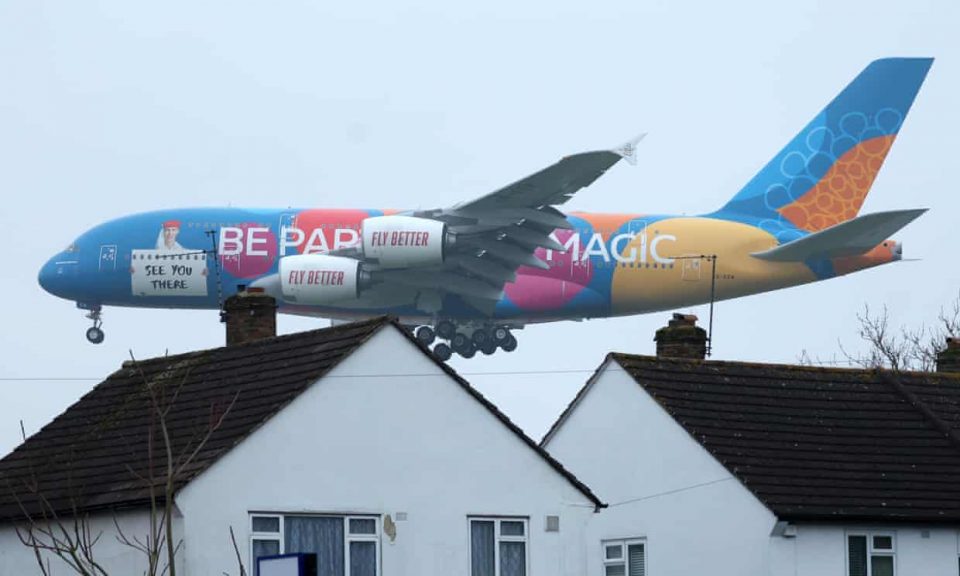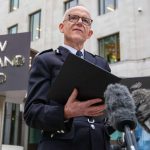Rachel Reeves’s initiative to widen the operations of Heathrow airport could lead to an increase of £40 in airline ticket prices, according to an analysis conducted by the Treasury.
To address the carbon footprint of a larger Heathrow, the chancellor has suggested using sustainable aviation fuels. However, experts indicate that these fuels are costly and unlikely to be produced in the quantities necessary for an expanded aviation sector, as highlighted in a recent report.
A Treasury cost-benefit study reviewed by the Guardian reveals that the adoption of sustainable fuels might raise the price of a single economy ticket by £37.80 by the year 2040. There are currently no measures in place to ensure that frequent travelers, or those flying in first or business class, contribute a larger portion of this added cost, with fare increases expected to apply universally.
The chancellor developed these climate strategies following criticism from energy secretary Ed Miliband, who has cautioned that expanding airport facilities could result in the UK violating its legally established carbon budget, which is essential for achieving the 2050 net zero emissions goal. According to a senior source, Reeves has been quite enthusiastic about Heathrow since last summer, applying pressure on Miliband and former transport secretary Louise Haigh.
While several cabinet ministers have expressed their approval of the chancellor’s sustainable fuel plans, others are worried that the initiative may be favoring short-term economic gains at the expense of addressing the climate emergency. This has been evidenced by the growing likelihood of economic downturns due to increasingly frequent natural disasters that damage infrastructure, homes, and the food supply.
During a press briefing at the World Economic Forum in Davos, Reeves stated that she considers economic growth to be a higher priority than achieving net zero during this parliamentary term. When asked to make a choice between the two, she remarked, “Well, if [growth is] the top priority, it’s clearly the most significant issue.”
There is a certain skepticism within Whitehall and beyond regarding the extent to which airport expansion would contribute to economic growth. A study commissioned by the Department of Transport under Haigh explored the growth implications of adding a third runway at Heathrow, indicating that any boost in economic activity would not be immediate since the airport would not accommodate additional flights until 2040. The most significant increase in passenger numbers would predominantly arise from transit travelers, who do not pay air passenger duty.
Reeves reportedly informed cabinet members that enhancing the mandatory use of sustainable fuels by airlines would counterbalance emissions. Nevertheless, Alethea Warrington, head of aviation at the climate advocacy group Possible, argued, “The government’s assertion that so-called ‘sustainable aviation fuels’ can mitigate the climate damage caused by new runways is illusionary. The availability of truly sustainable fuels for aviation will be very limited and nowhere near adequate to meet current demands, let alone the requirements for new runways. Any additional expenses should be borne by frequent flyers and those who can afford first-class travel, rather than the general public, most of whom fly infrequently or not at all.”
The Treasury’s assessment indicates that 75% of the costs associated with using more sustainable aviation fuel (SAF) will ultimately fall on consumers. Officials preparing the report acknowledged this, stating that ticket prices do not sufficiently reflect the overall social cost of flying or provide the necessary incentives for adopting decarbonization options like SAF.
Presently, airlines use highly pollutive kerosene for jet fuel. However, they could cut emissions by up to 80% by utilizing biofuels sourced from feedstocks, used cooking oils, or crops. Yet, this approach requires extensive land and utilizes crops that could otherwise be allocated for food. Recent findings from the Royal Society indicate that the UK would need to dedicate half of its arable land or more than double its total renewable electricity output to generate enough aviation fuel to meet its net-zero aspirations. Last year, Air New Zealand abandoned its 2030 decarbonization goals, citing challenges in sourcing sustainable jet fuel.
According to Alex Chapman, a senior economist at the New Economics Foundation, “We require emission reductions across all sectors immediately, and aviation must not be exempt under the guise of unsustainable fuels and tenuous arguments for growth. Instead of relying on unsustainable aviation fuels, the government should consider regulating the demand for air travel through measures like a frequent flyer tax.”
Most cabinet ministers who opposed airport expansion in the past now seem willing to support the growth of the four London airports. Seven cabinet ministers, including Prime Minister Keir Starmer, previously voted against expansion, alongside others such as Environment Secretary Steve Reed and Darren Jones, the Chief Secretary to the Treasury.
The Treasury has chosen not to provide any comments on the matter.


